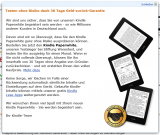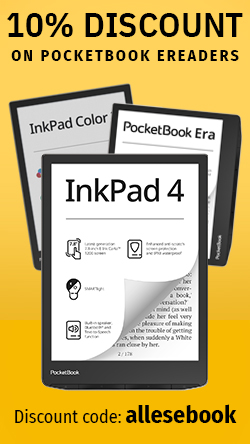Kindle Paperwhite: Leveraging 30-Day Return Policy to Compete in Tough German eReader Market

Amazon faces more challenges in the German eBook reader market than in any other. With the Tolino Alliance, there’s a strong national competitor for the first time, making things difficult for the retail giant not only with sometimes lower prices, but also with an extensive network of physical stores. Other booksellers also offer attractive eReaders with devices from Sony or PocketBook. It’s no surprise, then, that Amazon has repeatedly offered the Kindle Paperwhite at reduced prices and has been selling the basic Kindle for just 49 Euros for quite some time.
However, such price reductions likely result in significant losses, which isn’t a sensible long-term strategy. Therefore, Amazon is looking for other ways to make their offerings more appealing. One such effort can be seen on the Kindle Paperwhite product page. There, Amazon advertises a 30-day money-back guarantee. “If you’re not completely convinced, you can return it within 30 days without providing a reason—and we will refund the full purchase price,” states the homepage.
The Weakness of Online Retail
The peculiar thing is, it’s actually not a peculiarity. Amazon already offers a 30-day return policy on almost all items in their range. “You can return any products from Amazon shops to Amazon.de for a refund within 30 days of receipt, as long as the items are complete and unused and undamaged,” Amazon explains on their help pages.
With the new notice on the Kindle Paperwhite product page, Amazon apparently wants to convince skeptics, particularly those who have no prior experience with the retail giant.
This highlights the limitations of online retail quite clearly, as less tech-savvy individuals can easily encounter Tolino & Co. thanks to prominent placements in regular bookstores, whereas with Amazon, the situation is quite different. On the internet, one must already search specifically for information about eBook readers or the Kindle Paperwhite. While Kindle products are available in various electronic stores, these locations are naturally not as appealing as those in brick-and-mortar bookstores.
The importance of local presence was recently emphasized by Thalia, where around 80 percent of Tolino Shine were sold in offline stores during the 2013 Christmas season. Quite a surprising number, considering that things looked quite different at the beginning of 2013 (before the release of the Tolino Shine). It’s not surprising if the ratio is exactly the opposite for Amazon—80 percent online, 20 percent offline.
It will, therefore, be interesting to see how Amazon’s market share continues to develop. It’s entirely conceivable that the growth of Kindle devices will slow, while it continues to soar for their competitors, who are also represented in physical bookstores.

